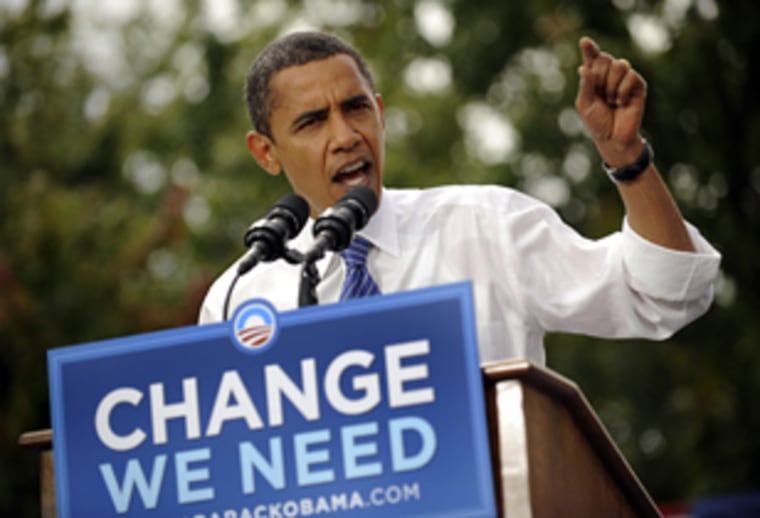The economy has become the most important issue for American voters ahead of the presidential election, according to the latest NBC News/Wall Street Journal poll.
And the numbers speak for themselves: Nearly six out of 10 voters are worried about their current financial situation, 77 percent believe the country is in a recession and three-quarters of those respondents believe the worst is yet to come.
This situation seems to benefit Democrat Barack Obama, who, according to the poll, holds a substantial advantage over Republican John McCain when it comes to economic matters.
The survey also finds that nearly half of voters don’t believe that McCain’s running mate, Alaska Gov. Sarah Pain, is qualified to be president should the need arise.
Additionally, more than 60 percent of respondents believe that McCain would “mostly” follow the agenda and policies of President George W. Bush, whose approval rating is mired at 30 percent.
Still, the poll shows that the presidential contest remains tight, with Obama leading McCain by just two points. “You look at this, and you can see all the signs of impending disaster for the McCain campaign,” said Democratic pollster Peter D. Hart, who conducted the poll with Republican Neil Newhouse.
“But for everybody who wants to close the door on this election, sorry. Not yet.”
According to the poll, Obama leads McCain, 48 to 46 percent. This is virtually unchanged from an NBC News/Wall Street Journal poll released immediately after the political conventions, which had Obama ahead by one point, 47 to 46 percent.
Newhouse observes that, despite all the recent news about the economy, it’s as if voters “hit the pause button on the campaign.”
These numbers appear to contradict another recent national poll that showed Obama with a much larger lead. But the McCain campaign argued Wednesday morning that the Democratic respondents outweighed Republicans by 16 points in that poll’s sample.
By comparison, this NBC News/Wall Street Journal poll has Democrats leading in party identification by just seven points.
Pluses and minuses for Obama
Despite Obama’s narrow lead in the NBC News/Wall Street Journal poll, there appears to be plenty of good news for him.
He holds a 12-point edge (46 to 34 percent) over McCain on the question of which candidate would best handle the economy — the voters’ top concern.
Indeed, 57 percent say economic issues (including job losses, home foreclosures and energy prices) will prove to be the most important factors in choosing a president on Nov. 4.
That’s compared to 17 percent who cite domestic issues (health care, education, the environment) as top concerns, 15 percent who single out foreign affairs (Iraq, Russia, the war on terrorism) and 10 percent who say social issues (guns, gay rights) are the most important.
Also in the poll, Obama has a 48 to 36 percent favorability/unfavorability rating, compared with McCain’s 46 to 38 percent score.
And 56 percent say they would be comfortable with Obama becoming the next president, versus 55 percent for McCain.
But Hart and Newhouse said there are a couple of warning signs in the poll for the Illinois Democrat.
First, McCain leads Obama among independents by 14 points, up six from earlier this month. And secondly, although voters say they identify with Obama’s values and background by a 50 to 44 percent margin, those numbers are essentially reversed among independent voters.
McCain’s foreign policy edge
As for McCain, he continues to enjoy an advantage when it comes to foreign policy. For instance, the Arizona senator holds a 47 to 38 percent edge on the question of which candidate would do a better job handling the war in Iraq
And while McCain trails Obama on the issue of the economy, he appears to have tapped into the anger voters feel on this topic.
Asked to pick between two these two statements below, a whopping 67 percent said they preferred the latter:
- End President Bush’s policies and have more oversight over government institutions
- Clean up Washington and take on waste and fraud
That second statement, in fact, is very similar to what McCain routinely says now on the campaign trail. “I'll tell you whose fault it is — corruption in Washington and corruption on Wall Street,” he said in Michigan last week. “And as president, I am going to clean it up, and I am going to fix it and return you back to the strength of our economy which you have earned and deserve.”
But McCain still has been unable to improve one of his biggest shortcomings headed into the presidential election. Sixty-one percent believe that the Arizona senator would mostly follow President Bush’s policies and agenda.
Also, just 32 percent think McCain can bring change to the country, versus 48 percent who say that about Obama.
Palin’s deflating numbers
And the person who was thought to be a shot in the arm for his campaign — Palin — may now be a liability. While 64 percent of respondents say that Obama’s running mate, Joe Biden, is qualified to be president if the need arises, just 40 percent would say the same about Palin.
Her favorability numbers also have decreased. After Palin’s selection, 47 percent viewed her positively versus 27 percent who saw her in a negative light.
Now in the most recent NBC News /Wall Street Journal poll, she has a 42 to 36 percent positive/negative rating.
Hart, the Democratic pollster, cites one factor behind her deflating numbers. “She is seen as not qualified. That is what has happened to her.”
Mark Murray covers politics for NBC News. NBC’s Domenico Montanaro and Lauren Appelbaum contributed to this article. The NBC News/Wall Street Journal poll was conducted of 1,085 registered voters from Sept.19-22. It has an overall margin of error of plus-minus three percentage points.
